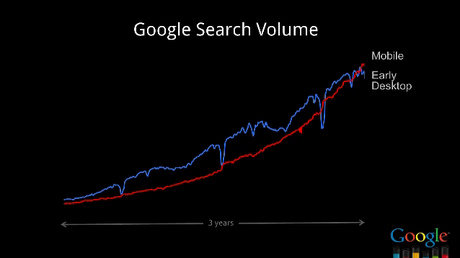Google refreshes mobile search, brings voice search to desktop

Searching via mobile browsers has surpassed the traditional desktop tool in terms of frequent usage. Thus, Google has added some serious improvements to its mobile optimized search tool.
Speaking at Google's Inside Search event in San Francisco on Tuesday, software engineer Amit Singhal noted that although desktop search tends to drop off during weeknights and weekends, mobile searching has filled the gap and actually surpassed the usage rate of searching via desktop browsers.
Singhal accredited the popularity of its mobile search engine as Google followed the its winning foundation for desktop searching: relevance, speed and the simplicity of Google's interface:
We were completely focused on the users and getting them the most relevant result as the first result...
On mobile, screens are smaller. Users are going to see just one result or two. It's even more critical that you get the first result right.
- New search interface for local searches
- Faster search results as repeated queries are integrated with the most-searched queries online (i.e. stocks, sports, weather, etc.)
- Infinite scroll on photo searches when using tablet browsers
- Interactive widgets about financial indexes (i.e. S&P 500)
Voice searching is also getting more attention. Mike Cohen, manager of Speech Technology for Google, said that Google Voice searching is now available for 27 languages and dialects around the world, which equates to covering approximately two-thirds of the world's population at five billion people.
We actually feed our speech recognition system massive amounts of data. From that, the system actually learns.
Google Voice has been forced to learn the different ways people put together words, sentences and phrases, as well as how these things vary by accent. In what takes "decades of CPU time," Google Voice has learned 230 billion words worth of data from real queries. Google execs promise that we'll see more of this feature as any mobile app that has the "virtue" of being on Android is speech-enabled.
Despite Google's special fondness for mobile these days, it's not neglecting desktop browser searching. Voice searching is being brought to the desktop with improved recognition and the ability to translate on the spot.
Google Images is getting even more useful as users will be able to search by the actual image file - not just a couple of keywords. There are four ways of going about this:
- Search by image, pick up image, drag it to search box and get results
- Copy and paste image URL
- Upload the file
- Chrome and Firefox extensions for discovering images while browsing the Web
This new feature is expected to roll out today. The last big introduction was the evolution of Google Instant, which primarily affects regular text query and image searching. Google users have already seen this to some extent when searching, and results appear in the search box before one has even finished typing.
Google Instant Pages basically enables sites to load as described: instantly. Using The Washington Post's site in Chrome as a demo, the browser incorporating Google Instant Pages was able to load the site instantly (0.0 seconds) versus the regular browser at 3.2 seconds.
The Google Instant platform is available now for use in 50 countries. Specifically, Google Instant Pages will be available today as well via Chrome's developer version and then later this week in Chrome beta.
Related:
- Google launches $280 million residential solar fund with SolarCity
- Google's tepid Chromebook reviews meaningless: It's all about business
- Android Honeycomb: Is GMail its only redeeming feature?
- Google finalizes deal to acquire Admeld yield optimization firm
- Privacy worries? Google shouldn't be your biggest fear
